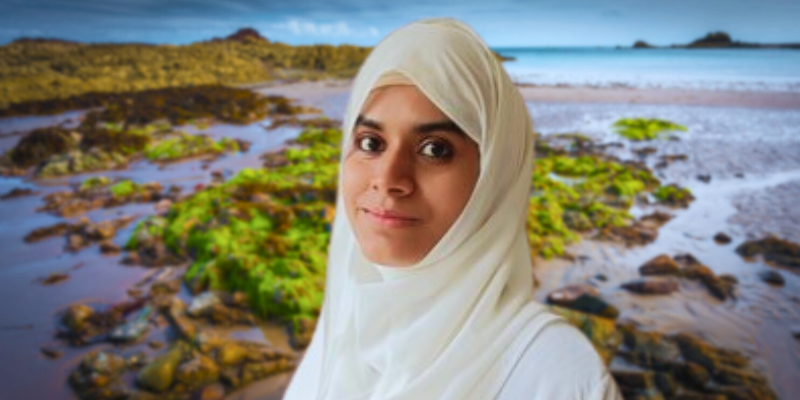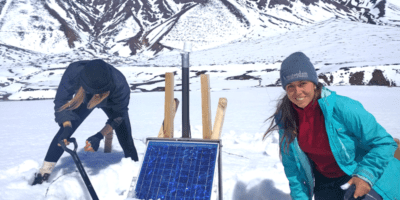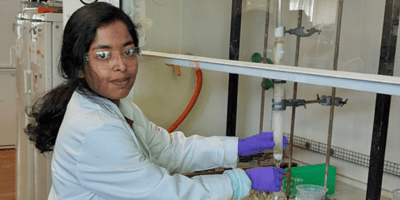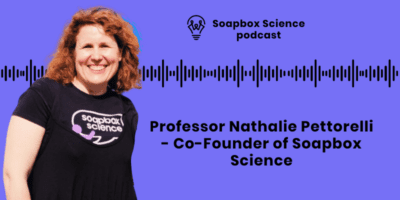Ishrat Jahan Badruddin is PhD student in manufacturing engineering, based in the School of Aerospace, Transport and Manufacturing at Cranfield University. In her Soapbox Science talk, she introduces the topic manufacturing of sea algae-based fibres using processes like wet-spinning, electro-spinning, and electro-spraying that can be used to create innovative and functional fabrics. The title of her talk is “Manufacturing UK/European based sustainable seaweed fibres for various applications”, and it will take place at 12 noon on Saturday 10th June 2023 at Middleton Hall in Centre: MK, Midsummer Blvd, Milton Keynes MK9 3QA.
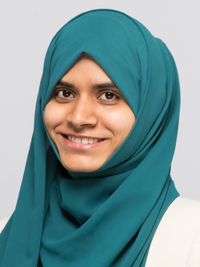
“Science is an unbiased realm of discovery, unaffected by societal constructs. The title of ‘scientist’ speaks for itself, transcending gender boundaries and embracing the power of knowledge.”
Nature’s calling: How the abundance of biopolymers inspired my journey towards sustainable innovation
Growing up in India, surrounded by lush agricultural landscapes, I was captivated by the abundance of biopolymers present in our environment. It struck me how we relied heavily on synthetic polymers when nature offered a treasure trove of sustainable alternatives. This realisation sparked my interest in exploring the untapped potential of natural materials in scientific and engineering applications.
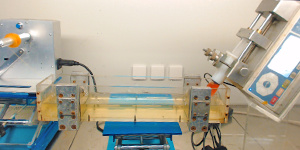
By replacing synthetic polymers with biopolymers derived from renewable resources, I am committed to minimising the negative environmental consequences of our past choices. I strive to create a world where sustainability and innovation intertwine, paving the way for a brighter future.
Unveiling the daily pursuit of research and discovery
My day-to-day activities involve a blend of scientific exploration, experimentation, and academic pursuit. I immerse myself in research papers and articles, seeking insights, inspiration, and identifying gaps in existing knowledge. This helps me build a strong foundation for my own research and understand the context of my work in the larger scientific landscape.
In the laboratory, I meticulously design and set up experiments, carefully selecting the parameters, materials, and methods to unravel the secrets hidden within seaweeds. There is a sense of excitement as I prepare the fibres from seaweed extracts, knowing that these humble organisms hold the potential to revolutionise materials science.
Data collection becomes a labour of love. I spend hours conducting experiments, carefully measuring and observing the properties of the biopolymers and the fibres I produce. The analysis stage is a mix of exhilaration and contemplation. It is here that the pieces of the puzzle start to come together, revealing patterns and insights that guide the direction of my research.
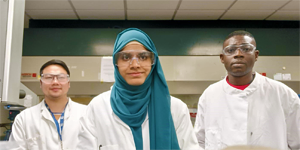
Collaboration and discussion are key pillars of my journey. I engage in vibrant conversations with fellow researchers, bouncing ideas off each other, and receiving valuable feedback and guidance. These interactions ignite new perspectives and push the boundaries of my thinking, enhancing the quality and impact of my work. These moments of sharing fuel my motivation, propelling me forward in my scientific journey. Through it all, I remain driven by a deep desire to make a positive impact on our planet.
This personal journey as a PhD researcher is filled with challenges, discoveries, and a sense of purpose. It is a privilege to be part of the scientific community, contributing to the collective effort of shaping a more sustainable world through my research on biopolymer-based fibres and the extraordinary potential of natural polymers.
Gender doesn’t determine who can be a scientist
Science is an unbiased realm of discovery, unaffected by societal constructs. The title of ‘scientist’ speaks for itself, transcending gender boundaries and embracing the power of knowledge. It is society that labels and limits, but in the realm of science, all are equal, all are capable, and all have the potential to contribute to the collective advancement of humanity.
In today’s world, it remains vital for both men and women to support and empower each other. By working together, sharing knowledge, and embracing diverse perspectives, we can create an Inclusive and equitable scientific community that fosters innovation and progress
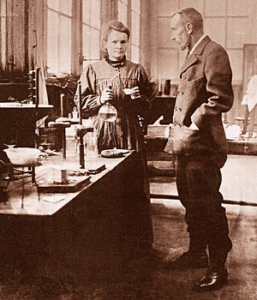
As I reflect upon the remarkable achievements of women in science, I cannot help but acknowledge the profound influence of Marie Skłodowska-Curie. Her ground-breaking discoveries in the field of radioactivity not only revolutionised our understanding of physics and chemistry but also opened new avenues for medical treatments.
Pierre Curie’s recognition of Marie’s exceptional abilities and his belief in her scientific potential were pivotal in her groundbreaking discoveries. Their partnership was one of mutual respect and collaboration. Together, they conducted ground-breaking research that led to Marie becoming the first woman to be awarded a Nobel Prize, not once, but twice — the Nobel Prize for Physics in 1903 and the Nobel Prize for Chemistry in 1911.
Their partnership exemplifies the importance of men and women working hand in hand, supporting, and uplifting each other in the pursuit of scientific excellence. In a remarkable display of humility and solidarity, Pierre refused to accept the Nobel Prize for Physics in 1903 unless Marie was included.
This act not only highlighted Marie’s significant contributions but also demonstrated the importance of acknowledging and honouring women’s achievements in science. Their partnership transcended societal expectations and showcased the transformative potential of mutual respect, collaboration, and shared goals.
A platform to plant seeds of inspiration in the minds of people
It may sound cliché, but it holds true: Rome was not built in one day. Soapbox Science provides a platform to plant seeds of inspiration in the minds of people, showcasing the invaluable contributions of female scientists in the advancement of science and engineering.
I am deeply honoured and overflowing with excitement to be a part of Soapbox Science in 2023, as I aim to ignite the spark of curiosity and passion in the next generation of scientists through sharing my own journey and research.
This event serves as a powerful reminder that scientists come in all shapes and sizes. Soapbox Science challenges preconceived notions, emphasising that scientists are diverse, vibrant, and capable of making a difference. By participating in Soapbox Science, I hope to inspire and empower young minds, instilling in them the belief that they too can pursue careers in science and engineering. I want to encourage them to dream big, break barriers, and challenge the status quo.
Being a speaker at Soapbox Science Milton Keynes
I am incredibly excited to share that I have been given the amazing opportunity of being a speaker at Soapbox Science, Milton Keynes on 10th June, 2023. From 12pm to 1pm, I will be taking the stage to dive into the captivating topic of “Manufacturing UK/European based sustainable seaweed fibres for various applications”, where I will discuss the future of fabrics using sea algae-based fibres and how this holds great promise for sustainability and innovation in the textile industry.
Through Soapbox Science, I am filled with anticipation to meet extraordinary scientists who excel in their fields. I am eager to learn from their unique perspectives, delve into their ground-breaking research, and witness first-hand the immense contributions they have made to the advancement of knowledge.

This gathering of brilliant minds will inspire, challenge, and ignite a passion for discovery, creating an environment where ideas flourish and new frontiers are explored. Together, we will forge new connections, expand our horizons, and collectively shape the future of science and innovation.
Staying connected
You can keep up to date with my latest research by following my LinkedIn profile and University webpage. It is a great way to stay informed about my professional activities, publications, and achievements. I look forward to sharing my latest findings with you through LinkedIn!
Main image credit (seaweed) — Image by dashu83 on Freepik

